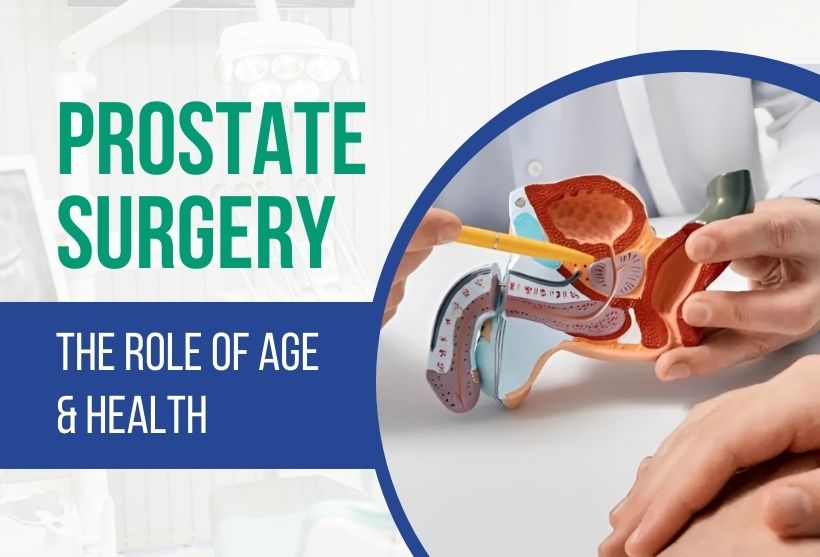Prostate Surgery: The Role of Age and Health

The world is moving at a fast pace; and to catch up with the fast-moving world, we at times forget to take into account our health. Men and women equally face different health challenges as they grow. But today, we are specially focusing on men's health. Among many health concerns that men face, prostate health stands out as a critical aspect that requires timely attention and action. Through this blog, we aim to share information about prostate health and the surgery options available to you.
What Is Prostate?
The prostate is a small gland in the male reproductive system, located just below the bladder and in front of the rectum. This gland plays a crucial role in producing seminal fluid (semen), which nourishes and transports sperm. However, as men grow older, the prostate can sometimes cause problems. One common issue is benign prostatic hyperplasia (BPH), or an enlarged prostate, which can lead to uncomfortable urinary symptoms.
Understanding Prostate Conditions
Benign Prostatic Hyperplasia (BPH): With age, the prostate gland naturally enlarges. This can press on the urethra, the tube that carries urine from the bladder, causing symptoms like frequent urination, weak urine flow, and difficulty emptying the bladder completely.
Prostate Cancer: Prostate cancer is the second most common cancer in men worldwide. It often grows slowly and may not cause noticeable symptoms in the early stages.
Prostate Surgery Options
Several surgical procedures are available to treat prostate conditions:
- Transurethral Resection of the Prostate (TURP): This is a common procedure for BPH where an instrument is inserted through the urethra to remove excess prostate tissue.
- Open Prostatectomy: This involves an incision in the abdomen to remove all or part of the prostate. It's typically used for larger prostates or when other conditions make TURP unsuitable.
- Laparoscopic or Robotic-Assisted Prostatectomy: These minimally invasive techniques use small incisions and specialized instruments to remove the prostate. They often result in less pain and faster recovery compared to open surgery.
The Impact of Age and Health
Age & health plays a significant role when deciding about prostate surgery. Younger men (under 50) have a longer life expectancy, meaning they have more time to potentially experience long-term side effects of surgery, such as erectile dysfunction or incontinence.
For middle-aged men (50-70), surgery may be a good option, even if the risks are slightly higher than in younger men. The presence of other health conditions becomes increasingly important in assessing surgical risks. In older men (over 70) the decision-making process becomes crucial. Conditions like heart disease, diabetes, or lung problems can increase surgical risks. The surgeon will carefully assess the patient's health to determine if they are a suitable candidate for surgery or not.
Decision Making
The decision to undergo prostate surgery is quite personal. It is essential to have a thorough discussion with your urologist to:
- Understand your condition: Discuss the diagnosis, severity, and available treatment options.
- Weigh the risks and benefits: Understand the potential benefits of surgery, as well as the possible risks and complications.
- Consider your individual needs: Your age, overall health, lifestyle, and personal preferences should all be taken into account.
Prostate surgery can significantly improve the quality of life for men with prostate health conditions. However, age and overall health are important factors to consider when making treatment decisions. By working closely with your urologist, you can make informed choices that align with your individual needs and health goals. Remember, open communication with your doctor is crucial throughout the process.
